
Molly S.
Business-savvy enthusiast with a mindset on growth and advocate for mental health!
Updated by Molly S. on 9/12/24
“Am I getting enough sleep?”
“Why can’t I sleep?”
“I am so tired, why won’t I sleep?”
These are common questions I’m sure everyone can relate to. Getting a good night’s 8 hours of sleep is one of the most important things you can do for your health.
It’s actually just as important as exercising and eating a balanced diet. Unfortunately, for many, there are things that can interfere with sleeping undisturbed, such as anxiety symptoms, sleep disorders, or bad sleep posture.
This article is a guide to help you realize why getting 8 hours of sleep is necessary, and how better sleep will drastically improve your quality of life.
Is Sleeping 6 Hours enough? Here are 5 reasons why it isn’t, and tips on how to sleep better:
1. Good sleep increases productivity and concentration

I recently read an article by The Sleep Foundation, and they referenced a study by the Centers For Disease Control (CDC) that found almost one-third of Americans get less than 6 hours of sleep per night.
Getting less sleep than necessary has a negative effect on numerous biological processes that provide rejuvenation to the body and mind.
Not only can low quality sleep affect your motivation and productivity, but it can cause chronic distress and psychiatric conditions, increased mortality and morbidity, increased healthcare costs, direct economic costs, and a reduction in overall wellness (1).
Another study from the National Center for Biotechnology Information (NCBI) found that 38% of the U.S. workforce suffer from fatigue at their jobs. That’s almost 60 million people who are either not sleeping enough, or potentially have some sleep disorder.
What are the Effects of not sleeping enough?
Due to lack of sleep affecting your overall wellness, it can also impact your happiness, emotional stability, positivity, and work performance.
If you are currently questioning whether you want to quit your job or change careers, it’s highly recommended you first look at your sleep as a factor. Your life may be suffering because of your sleep.
Try to aim for a routine of getting at least 8 hours of sleep before making any life-altering decisions. Only when you have good rest can you safely trust your judgement, and work toward your goals.
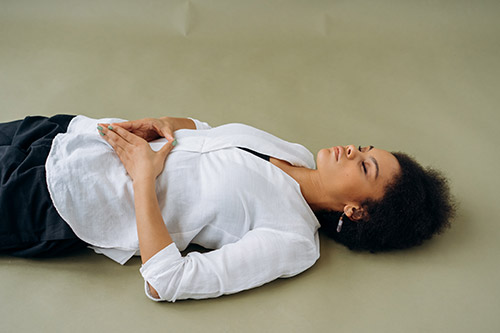
What’s the best position to sleep for maximum productivity?
If you’re curious on what sleeping position is best, it really depends on your health conditions. Here are some popular sleeping positions that ThriveGlobal suggests from expert review:
- Sleeping on your back — An excellent position that aligns your shoulders, neck, and spine symmetrically.
- Sleeping on your back, reclined or with knee support — Similar to above, but you either stick a pillow under your knees, or recline your back upward a little. It’s popular for people who don’t like to lie straight.
- Sleeping on your side — This is the preferred sleeping method amongst most people. Although our bodies appear symmetrical on the outside, on the inside our organs are very asymmetrical. Believe it or not, there is a proper side to sleep on.
What is the best side to sleep on?
Science suggests your left side should be your go-to. One reason is it reduces acid reflux. When you sleep on your left side, your stomach’s gastric juices remain lower than the esophagus.
Also, your bowel movements have a more natural flow with the direction of gravity. When you lie on your left side, your digestive waste travels through the ascending colon, down (or across, technically) your transverse colon, and is dumped down the descending colon.
If you were to lie on your right side, your waste would have to work against gravity as it travels through your transverse colon.
What’s the takeaway?
There’s nothing worse than waking up from a bad night of sleep. It’s hard to pull yourself out of bed, you feel groggy, and your motivation to get things done can be extremely low.
Experts recommend getting 7-9 hours of sleep per night, either lying on your back or left side. Only then will you have the optimal energy levels necessary to live a productive life.
2. 8 hours of sleep improves your immune system

Scientific evidence is building that getting adequate sleep is an important part of physical health, in addition to your body’s immune system. Lack of immune response or dysfunction could otherwise lead to a variety of conditions.
Some of these include increased risk of cancer, infection, cardiovascular and metabolic disorders. According to various NCBI studies, not getting enough sleep can also be a cause of sleep paralysis, in addition to chronic inflammation.
Prolonged reduction of sleep invokes a persistent unspecific production of pro-inflammatory cytokines, best described as chronic low-grade inflammation, and also produces immunodeficiency, which both have detrimental effects on health (2).
(Pro-inflammatory cytokines are protein molecules released by immune and other types of cells that signal other cells to promote inflammation.)
This is one reason it’s important for those with highly oxidative cardiovascular conditions like diabetes to get enough sleep every night.
So, to answer your question: is sleeping 6 hours enough? No, it’s not.
Without 8 hours of sleep per night, your body will not have a chance to heal and reduce chronic inflammation. This increases your chance of cardiovascular-related issues like heart attack, and certain upper respiratory conditions.

One of the symptoms of not sleeping enough in people with asthma is increased asthma attacks, according to Science Daily.
Not to mention, there was a study done by the University of California San Francisco that looked into why sleep is so important regarding vaccines. Here’s what they found:
People who sleep less than 6 hours per night do not mount proper antibodies (11.5 times less) for certain vaccines than those who sleep greater than 7 hours per night. The study found that sleep quality wasn’t a factor, just sleep duration (3).
The vaccines of focus were Hepatitis A and influenza, however, researchers speculate the same cellular behaviors and responses to sleep patterns could also play a role in COVID-19 vaccinations.
So, is 8 hours of sleep enough every day? Absolutely.
You can see why it’s imperative to get more than 6 hours of sleep, in addition to eating healthy foods that boost your immune system.
What’s the takeaway?
Getting better sleep should be one of your top priorities every day. Otherwise, not only will your personal and professional life suffer, but your body’s immune system won’t be strong enough to fight off sickness.
3. Bad sleep increases risk of heart disease and stroke
Not only does getting too little sleep affect your energy levels throughout the day, but if it happens for too long, it can affect your heart health.
When you sleep your blood pressure decreases, and so, getting less sleep means your blood pressure is higher for longer. Chronic high blood pressure is a leading cause of heart attacks and stroke (4).
Sleep apnea and insomnia are both sleeping disorders that can affect your health and cause conditions such as heart failure, diabetes, obesity, asthma, and depression (4).
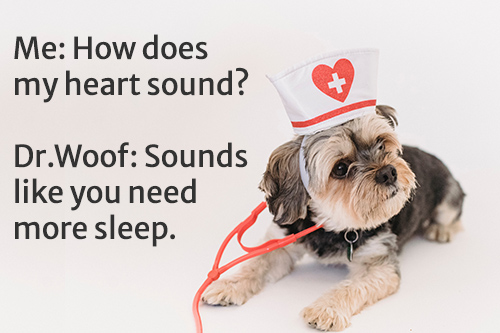
Besides getting more sleep, there are a few things you can do that are proven to strengthen your heart. These steps are especially important to follow if you’re a diabetic, like myself! (Type 1).
Here are a few tips for better sleeping at night:
- Get more natural sunlight during the day.
- Make a consistent exercise routine. However, don’t exercise a few hours before you go to bed.
- Avoid white and blue light before bed. These wavelengths block melatonin, which makes you sleepy.
- Reduce noise at bedtime, keep your room cool, and dark.
- Try to go to bed at the same time every night.
Not only is getting adequate sleep necessary for good health, but it’s an important goal that’s necessary to follow if you want to have good mental wellness to succeed in your personal and professional life.
What’s the takeaway?
If you’re wondering how to get better sleep at night, consider relaxing a few hours before bed and avoiding white and blue light. Otherwise, your body can’t prepare itself to shut down properly, and you’re guaranteed to feel the side effects of not sleeping enough.
4. Lack of sleep linked to anxiety and depression
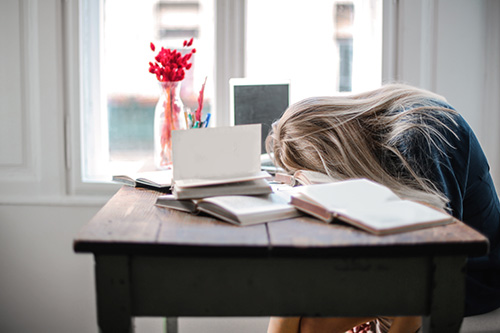
There is an undeniable link between sleep disorders and mental health. In fact, the link between the two is so fundamental that some researchers suggest a diagnosis of depression in the absence of sleep complaints should be cautioned (5).
Sleep disturbance is one of the proven risk factors of depression and suicide. And if symptoms of the disease alleviate but a sleeping disorder remains, there is a significant risk of relapse.
If you suffer from a mental disorder such as chronic anxiety, try your best to get at least 7-8 hours of sleep per night.
It’s also important that you eat a balanced diet, and always include foods that boost your mood to relieve anxiety symptoms.
You will be surprised by how your energy will improve and your outlook in life will sharpen by simply having a better sleeping routine. But length of sleep isn’t the only factor, it’s quality, too.
How to Get Better sleep quality to reduce stress and anxiety
Getting better sleep at night isn’t just about being comfy and dreaming of your childhood passions, it’s about consistency and good daytime habits. Here are a few that may help you sleep better at night:
- Reduce caffeine intake.
- Reduce irregular naps, and for how long you nap.
- Go to sleep and wake up at the same time every day.
- Don’t drink alcohol. Just like blue light, alcohol can disrupt your ability to produce melatonin.
- Eliminate noise and external light. Although for some, noise can actually help. If so, consider purchasing a white-noise maker, or go to YouTube and search for “8 hours of sleep music” or “sounds to sleep“.
- Make sure your room is at an optimal temperature. For most, this is 70°F (20°C).
When I’ve had anxiety in the past, this video has helped me tremendously.
The song Weightless by Marconi Union was designed specifically to reduce stress, by arranging harmonies, rhythms, and bass lines, to slow the listener’s heart rate and lower levels of the stress hormone cortisol.
What’s the takeaway?
If you’re looking for tips on how to sleep better and faster to reduce anxiety, consider the importance of your sleep quality. Having bad sleep can cause anxiety, and vice versa. You’ve got to get both under control to have stability in your life.
5. Sleep affects personality and social interactions
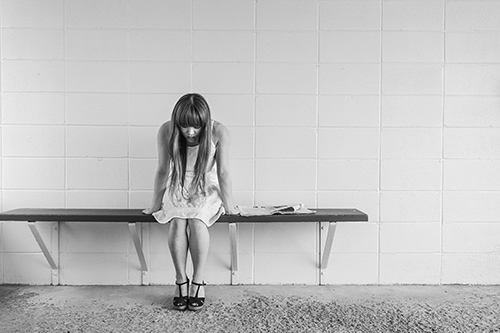
Have you ever pulled an all-nighter and found yourself still awake at 7 a.m., nearly zombified and debating whether you should at least take a nap?
I’m sure we all have. It’s part of living the good life! However, you can’t live the good life forever.
As you get older, your body needs the sleep. You can’t function properly without it.
Sure, when you’re in your teens and 20s, it’s easy to have a chaotic schedule, partying, staying up late, and reading blog articles on how to find your passion and become a millionaire.
And these are all things you can continue to do for the entirety of your life, but you can’t do it at the cost of sleep. You HAVE to rest—at least 8 hours of sleep per night.
Not only will your brain not be able to function at full capacity without it, but your personality will eventually be affected. It can even cause you to become introverted and asocial.
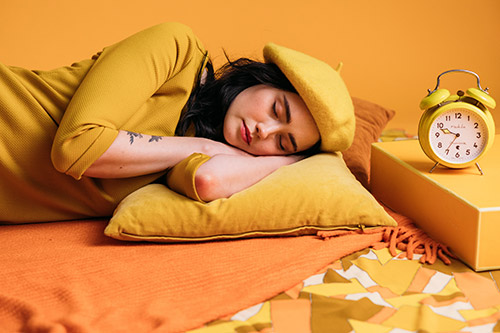
Is sleeping 6 hours enough? No! It will ruin your life.
It can affect your professional life, and cause you to hate your job. When, in reality, it’s not your job that’s the problem, it’s your sleeping schedule.
Also, you shouldn’t get more than 8-9 hours of sleep. Any more than that and you may find that you are tired from oversleeping.
If you work a regular 9-5 job, consider getting to bed every night by 11 p.m. This way you will be in bed by 11, and hopefully fall asleep by 12 a.m., giving you an optimal 8 hours of sleep. The last thing you want is for your boss to despise you because you are always late for work.
What’s the takeaway?
If you find you are having trouble getting people to like you, you are not sleeping enough, or are waking up tired after 8 hours of sleep, take a look at your sleeping schedule. You should be getting 7-9 hours of sleep every night—no more, and no less.
Conclusion
If you are struggling in life and find you aren’t getting good sleep, consider that sleeping better can help to mend things.
You may realize that life will become more enjoyable, you will see the goodness in laughter, and you’ll find happiness in places where you never thought happiness existed.
Here’s a quick recap of “Is sleeping 6 hours enough? (5 Reasons it’s not)”:
- Good sleep increases productivity and concentration.
- 8 hours of sleep improves your immune system.
- Bad sleep increases risk of heart disease and stroke.
- Lack of sleep linked to anxiety and depression.
- Sleep affects personality and social interactions.
That’s all folks! Thanks for reading.
Feel free to comment below if you liked this article on “Is sleeping 6 hours enough? (5 Reasons it’s not)”. I’d love to take questions or suggestions on other content you’d like to see on eHowdy!

How to Build a Satisfying Career Without a Five-Year Plan
We’re often told that the key to success is having a clear five-year plan: a set path that leads from point A to point B with no deviations. But what if you could build a career without rigid timelines or predefined steps? Here’s how to create a fulfilling professional life without feeling boxed in by the pressure of a fixed plan.
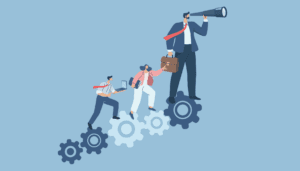
The Difference Between a Good Boss and a Career-Changing One
Not all bosses are created equal. Some are great at what they do—they lead teams, meet targets, and ensure things run smoothly. But then there are the career-changing bosses. The ones who don’t just help you get through your workday—they transform the way you see your career, your potential, and your path forward. Here’s how to tell the difference between the two.

Healthy Ambition vs. Internal Competition: There’s a Difference
Ambition isn’t the problem. It’s the pressure to outdo our past selves that can get quietly toxic. Many high achievers don’t compete with others—they compete with their own last milestone. The last raise. The last big win. That drive can be powerful, but left unchecked, it turns into a moving target that never lets you rest. Here’s how to recognize the difference between healthy growth and harmful self-comparison.
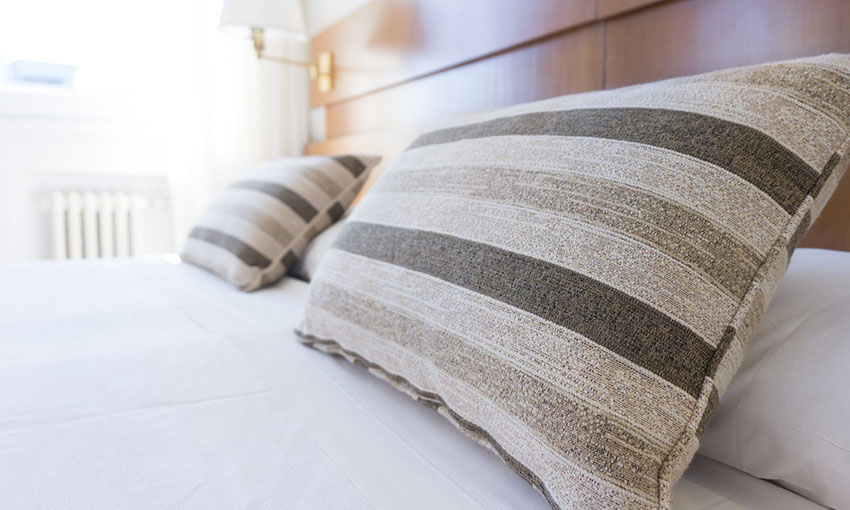
Great article! I usually only sleep like 6 hours a night and I feel ok, but I didn’t know sleep can affect how well vaccines work! Keep up the nice work
I’m so glad you liked it article! I wouldn’t rely on sleep to make vaccines more effective, but it’s definitely something to think about. Anyways, sleeping just makes you feel better all around. Cheers